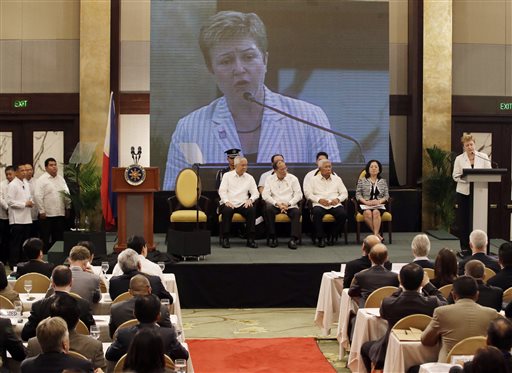Nations to adopt Tacloban Declaration

Kristalina Georgieva, EU Commissioner for International Cooperation, Humanitarian Aid and Crisis Response, addresses delegates at the opening of the ASEM Conference on Disaster Risk Reduction and Management, Thursday, June 5, 2014 in Manila, Philippines. AP PHOTO/BULLIT MARQUEZ
MANILA, Philippines–The Philippines’ successes and frustrations in the face of disasters was in the spotlight on Thursday as the country hosted the Asia-Europe Meeting’s (Asem) Conference on Disaster Risk Reduction and Management (DRRM), an event that is drawing lessons from Super Typhoon Yolanda (international name: Haiyan), which is seen to set the stage for the United Nations’ global disaster meeting in Sendai, Japan, next year.
Some 140 high-level officials, experts and scientists as well as academics, business and civil society leaders are expected to wrap up the three-day conference on Friday with the Tacloban Declaration, a document envisioned to “embody specific proposals and principles for a global framework for disaster risk reduction and management for the next 20 years,” said Foreign Secretary Albert del Rosario.
The declaration, which would take the place of the 2005 Hyogo Declaration on DRRM expected to expire next year, hopes to encapsulate learnings from the Philippine experience in responding to the super typhoon, the strongest to ever hit land, killing more than 6,000 people and affecting an estimated 14 million across the Visayas.
“The Asem Manila conference therefore puts the spotlight on the Philippines to contribute meaningfully to the global discourse on DRRM. Our experience, including our frustrations, will be our guideposts during this conference as host and discussant,” said Del Rosario in a press conference.
“I think we now know the importance of centrality of government, that we should be the ones to set the agenda. We also know the role of the international community in terms of the cooperation that we badly need. No one nation can do this on their own,” he said.
Addressing the delegates, President Aquino exhorted countries to mount a “focused effort” to combat the creeping climate change or face dire consequences.
The President said tragedies caused by climate change had become “more devastating” and “larger in scale,” citing the recent heavy flooding in the Balkan region as an example.
But he reminded the delegates that a warming climate sweeps across many countries, including developing countries like the Philippines that leave little carbon footprint.
Closer to home, the huge devastation wrought by Yolanda on Eastern Visayas in November last year was a case in point, he said.
“What did the thousands who perished, and the millions affected by that super typhoon, do to deserve such a fate? Is it not incumbent upon all of us to address the problem of climate change as one global community in the soonest possible time?” he said.
Given this reality, Aquino said countries around the world could “not sit idly by” as the effects of climate change worsened.
“It is vital—now more than ever—that we mount a focused, international effort to address the threats posed by climate change, and to build communities that are resilient in the face of disaster,” he said.
Global leaders in the advocacy for DRRM cited how global cooperation toward establishing DRRM protocols was an imperative as the impact of climate change was no longer a hypothetical situation but a reality for the world.
“Two significant shifts are absolutely paramount. One: Recognizing that climate change is no more a problem of the future, it is with us today, to lift up our determination to fight climate change and build the international consensus for this to happen. Second, to rebalance our approach towards climate change. It is no longer enough to fight for reduction of emissions. It continues to be very important, but equally important is to adapt to consequences of climate change,” said Kristalina Georgieva, European commissioner for international cooperation, humanitarian aid and crisis response.
“Climate change is happening, thus, we need to adapt. And I think the Tacloban Declaration brings more consensus and clear commonality in approach between Asia and Europe on this rebalancing and lifting up the significance of doing this rebalancing,” she said.
Margareta Wahlström, special representative of the UN secretary general for disaster risk reduction, echoed this view.
“I think the opportunity now is instead of looking at debate on mitigation, to accept what has become very clear … This is not a hypothetical future. This is today, actually even yesterday for many countries in the world. So take that learning and really get the courage to tackle many of the practical issues from that,” she said.
Considering the scale of the destruction wrought by Yolanda, Georgieva said the Philippines “should be proud” of what it has so far accomplished in terms of addressing the needs of millions of typhoon survivors, despite remaining challenges.